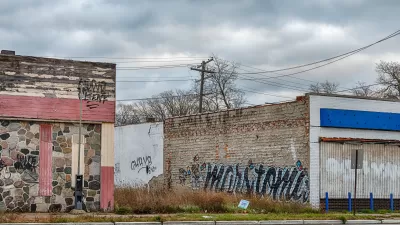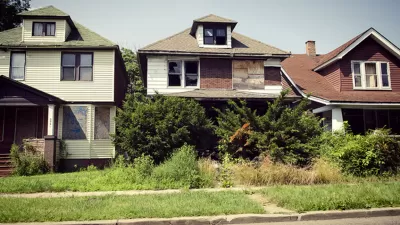John Gallagher investigates a growing trend of unsanctioned urban agriculture in Detroit, where residents have had to take alternative land use into their own hands.
Nearly thirty percent of Detroit's usable land area lies vacant today – not merely plots with abandoned buildings, but "empty fields from which all structures have been removed," Gallagher writes. And among the many alternative uses that residents have thought up for all that space, the most notable trend in recent years has been a surge in urban agriculture, with one farm growing as large as four acres.
"The gardens operate as small, nonprofit, volunteer-based plots on which residents grow fruits and vegetables," Gallagher reports. "In most cases, the food is donated to food banks, given away to neighborhoods or consumed by the growers themselves."
Without an official zoning classification, however, urban farmers in the Motor City have had to operate without legal sanction. There have been formal proposals to make use of the land, from large-scale agriculture to solar fields, "but city government – underfunded, understaffed and risk-averse – has hesitated to approve any of [them]."
In addition to gardens, Detroiters have been fencing in the empty lots around their own homes to create large, "suburban-size parcels" for playgrounds, parking lots, tool sheds, and the like. The practice of claiming these "blots" (a portmanteau of "block" and "lot") has slowly transformed the landscape of the city into one reminiscent of a subdivision. Margaret Dewar, professor of urban planning at the University of Michigan, claims that only 40% of "blots" in the city are on record with the city assessor's office. In Gallagher's words, "That's an indication that many owners are just taking the lot rather than buying it from the city or some other owner."
While Mayor Dave Bing is reaching out to residents to offer guidelines on how to use vacant land, community gardener Kofi Royal remains skeptical of the City's involvement. "Like I always tell people around here, we've got to do this because the cavalry might not be coming."
FULL STORY: With their city shrinking, many Detroiters use empty lots to grow gardens

Alabama: Trump Terminates Settlements for Black Communities Harmed By Raw Sewage
Trump deemed the landmark civil rights agreement “illegal DEI and environmental justice policy.”

Study: Maui’s Plan to Convert Vacation Rentals to Long-Term Housing Could Cause Nearly $1 Billion Economic Loss
The plan would reduce visitor accommodation by 25% resulting in 1,900 jobs lost.

Planetizen Federal Action Tracker
A weekly monitor of how Trump’s orders and actions are impacting planners and planning in America.

Waymo Gets Permission to Map SF’s Market Street
If allowed to operate on the traffic-restricted street, Waymo’s autonomous taxis would have a leg up over ride-hailing competitors — and counter the city’s efforts to grow bike and pedestrian on the thoroughfare.

Parklet Symposium Highlights the Success of Shared Spaces
Parklets got a boost during the Covid-19 pandemic, when the concept was translated to outdoor dining programs that offered restaurants a lifeline during the shutdown.

Federal Homelessness Agency Places Entire Staff on Leave
The U.S. Interagency Council on Homelessness is the only federal agency dedicated to preventing and ending homelessness.
Urban Design for Planners 1: Software Tools
This six-course series explores essential urban design concepts using open source software and equips planners with the tools they need to participate fully in the urban design process.
Planning for Universal Design
Learn the tools for implementing Universal Design in planning regulations.
Caltrans
Smith Gee Studio
Institute for Housing and Urban Development Studies (IHS)
City of Grandview
Harvard GSD Executive Education
Toledo-Lucas County Plan Commissions
Salt Lake City
NYU Wagner Graduate School of Public Service





























